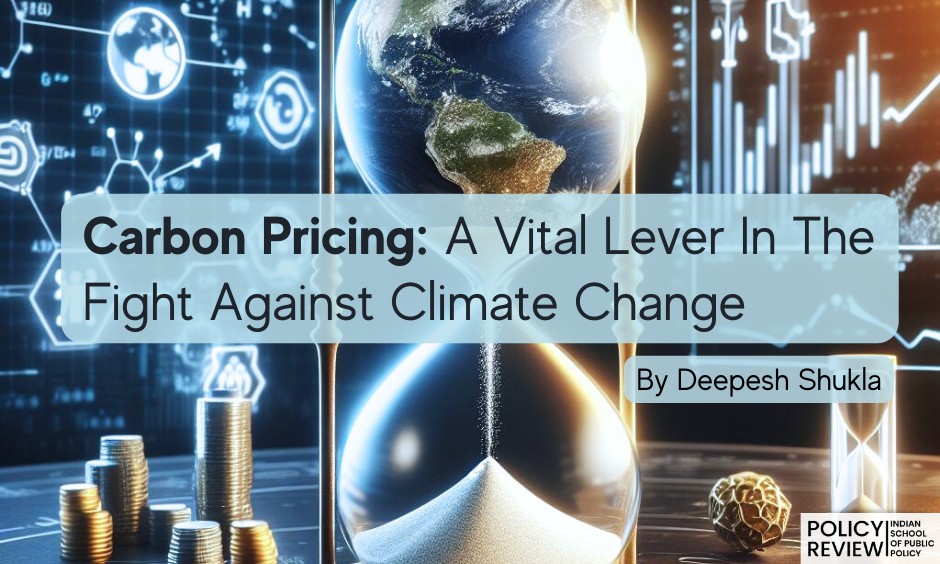
Carbon Pricing, A Vital Lever In The Fight Against Climate Change

The universal demon of climate change and our never-ending war against it has a long history. In this battle against climate change, carbon pricing mechanisms have emerged as a vital tool on both the national and international stages. These frameworks, such as carbon taxes and cap-and-trade systems, aim to make emissions costlier, encouraging individuals, businesses, and nations to reduce their carbon footprint. While their efficiency may be a subject of debate, there is sufficient evidence backing their potential to make a significant impact in the battle against greenhouse gas emissions.
Carbon pricing is a policy approach that aims to internalise the external costs of carbon emissions by making emitters pay for the pollution they generate. This can be achieved through two primary methods. Firstly, through carbon taxes, which are levies imposed on the carbon content of fossil fuels, to encourage a shift to cleaner energy sources. The revenue generated can be used for various environmentally sustainable initiatives like energy efficiency programs and afforestation. Then, we have Cap-and-Trade Systems, where a cap is set on the total emissions allowed while the emission permits or allowances are traded in a market. This system incentivises companies to reduce emissions and can eventually lead to more efficient emission reductions.
Carbon pricing also aligns with the Paris Agreement as it provides a market-based strategy for reducing emissions. Internationally, the Paris Agreement has brought fruitful changes and progressive milestones in our battle against climate change. This agreement sets well-defined goals for reductions in emissions and encourages nations to cooperate to minimise their carbon emissions. When countries adopt similar carbon pricing mechanisms, such as cap-and-trade systems or carbon taxes, they create a shared language for mitigating carbon emissions. Moreover, carbon pricing establishes a tangible economic incentive for nations to work together. By participating in a global market for emission allowances or permits, countries have a direct stake in each other’s emission reduction efforts.
Globally, carbon pricing measures have demonstrated their effectiveness in reducing emissions. The EU leads with the EU Emissions Trading System (ETS), setting emission caps and fostering allowance trade. The World Bank report on carbon pricing indicates a 36% reduction in emissions under the ETS since 2005, highlighting its effectiveness. In the USA, diverse state-level strategies exist, with successful cap-and-trade programs like California’s contributing to a 12% reduction in emissions from covered sectors since 2005. In New Zealand, the Emissions Trading Scheme (NZ ETS) mandates industries to surrender emissions units, adding to the global trend of dynamic carbon pricing strategies (World Bank, 2023).
On the other hand, even developing countries like Vietnam have solidified their carbon pricing commitment with a revised Environmental Protection Law. It outlines a roadmap for developing a domestic emissions trading scheme and a national crediting mechanism, with plans for a pilot ETS in 2026 and a full launch in 2028 (World Bank, 2023). These figures from different regions in the world highlight the crucial role of carbon pricing in achieving sustainable climate goals worldwide.
Following the global examples, India has also taken steps towards creating a domestic carbon market. In July 2022, the Indian Lower House amended the 2001 Energy Conservation Act, establishing a framework for the carbon market and allowing the issuance of carbon credits (Nandi, 2022). The Upper House endorsed the bill in December 2022. Further, the Ministry of Power is consulting on a framework for the Carbon Credit Trading Scheme as of April 1, 2023. At the same time, some states have initiated pilot schemes, such as Gujarat’s cap-and-trade scheme in 2020. These actions reflect the country’s commitment to address climate change using effective carbon market mechanisms.
While carbon pricing holds promise as an effective strategy to address climate change, critics highlight concerns about ineffective enforcement and potential loopholes. The argument is that weak enforcement and loopholes can compromise the policy’s effectiveness, allowing industries to relocate to regions with less stringent regulations, thereby undermining the intended environmental benefits. To counter these challenges, it is crucial to establish a robust regulatory framework with transparent monitoring and enforcement mechanisms. For instance, consider the success of the Nordic carbon pricing model. By implementing stringent regulations and consistently updating monitoring systems, Nordic countries have minimised the risk of emissions leakage and demonstrated the viability of an effective carbon pricing system.
As the winds of change sweep through our planet, carbon pricing offers a sturdy sail, propelling us towards calmer, greener shores. It becomes evident that carbon pricing mechanisms play a pivotal role in curbing greenhouse gas emissions, both at the national and international levels. They provide economic incentives for emission reductions and generate funds for environmentally sustainable initiatives. However, their effectiveness depends on their design, implementation, and the broader context of complementary policies. Carbon pricing is more than a tool for climate mitigation, for it stands as a beacon of hope, potentially offering the elixir we need to heal the wounds inflicted by climate change, provided we wield it with unwavering determination.
References:
- Nandi, J. (2022, May 24). Gujarat to launch India’s first carbon trading market among large polluters. Hindustan Times. https://www.hindustantimes.com/india-news/gujarat-to-launch-india-s-first carbon-trading-market-among-large-polluters-101653415939802.html
- World Bank. (2023). State and Trends of Carbon Pricing 2022 https://openknowledge.worldbank.org/entities/publication/a1abead2-de91-5992-bb7a 73d8aaaf767f

Deepesh Shukla
PDM Scholar, Class of 2024,
Deepesh Shukla is a history graduate from DU and is currently immersed in the field of public policy at ISPP. He has focused on preparing for the UPSC Civil Services for five years, fuelled by a sincere commitment to public service. Beyond academics, his love for writing has led him to craft hundreds of poems. This journey reflects his academic pursuits and his eagerness to contribute meaning to his society through the lens of public policy. He aspires to bring a unique blend of analytical thinking and creative expression to address societal challenges.

